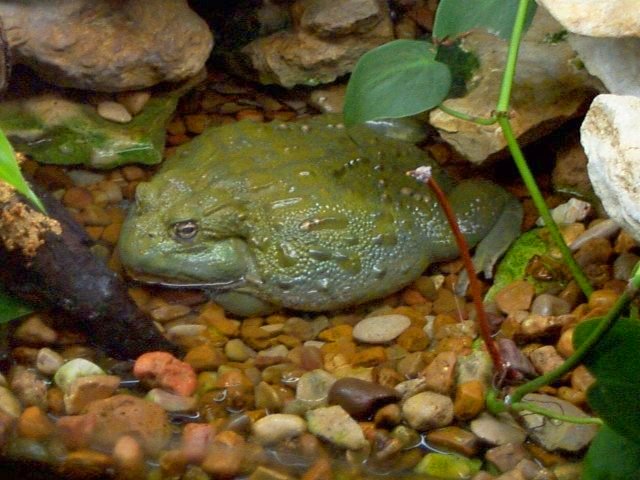 |
 |
| Name: African Bullfrog |
| Scientific name: Pyxicephalus adspersus |
| Range: Central, Eastern, and South Africa |
| Habitat: Waterways, river, streams |
| Status: Not threatened |
| Diet in the wild: Anything that they canfit in their mouths is considered appropriate for them |
| Diet in the zoo: , Butterworms, crickets,earthworms, goldfish, and small mice |
| Location in the zoo: Not currentlyon exhibit |
| General information:The African bullfrogs are unique in a few ways such as they can dig holeswith their powerful legs. They spend about as much time out of the wateras they do in the water. The bullfrog ranges from central to eastern andsouthern Africa. The African bullfrog has adapted to its environment prettywell. It has three canine like teeth that protrude from the lower jaw.These teeth are used to fight off would-be predators and to hold fast toits prey. The bullfrog will try to eat anything that will fit in its mouth,including the hand of an incautious human. The row of teeth has been knownto draw blood from the recipient of the bite. Adult bullfrogs seem to bevery aggressive if provoked and will swell up to intimidate you. Some Africanbullfrogs have been known to grow to be as old as forty years old and ifnot older in some cases. It can take a bullfrog in the dessert environmentas long as 28 years to reach its full size. |
| Special anatomical, physiologicalor behavioral adaptations: The African Bullfrog has sharp teeth to fight off predators and tochew big prey. Its large size and mouth gives it a wide range of potentialfood. It also has very strong hind legs to dig holes to keep cool and toshelter itself. The frog has extremely big mouth like that of a hornedfrog only that it has a longer snout. The African Bullfrog uses its muddylooking skin to blend in to the surroundings of the bank and wait for prey. |
of the Fort Worth Zoo. They sure are big for a frog and are very lazy until feeding timethen they get a little more active. The zoo keeper that cares for the AfricanBullfrog said that the males are aggressive and that even the young offspringare aggressive also. (Note: this animal is not currentlyon exhibit at the zoo) |
| Personal Observations: The Bull frogs even though they are aggressive would probable be acool pet to have. The only problem is that they would require a lot ofcare to keep them healthy. These frogs need lots of sun and plenty of food.The African Bullfrog that is located here at the Fort Worth Zoo is a maleand from what the zoo personnel said it has a problem with biting and shouldbe and rarely is handled. |
| Related Links: |
| Page author: Mark Dissinger sprout_gs@hotmail.com |
| Source list: FantasticFrogs, by Jerry G. Walls (C.) T.F.H Publications. African Bullfrogs, by James Walker (C.) T.F.HPublications |
WhoZooHome Reptiles and Amphibians |